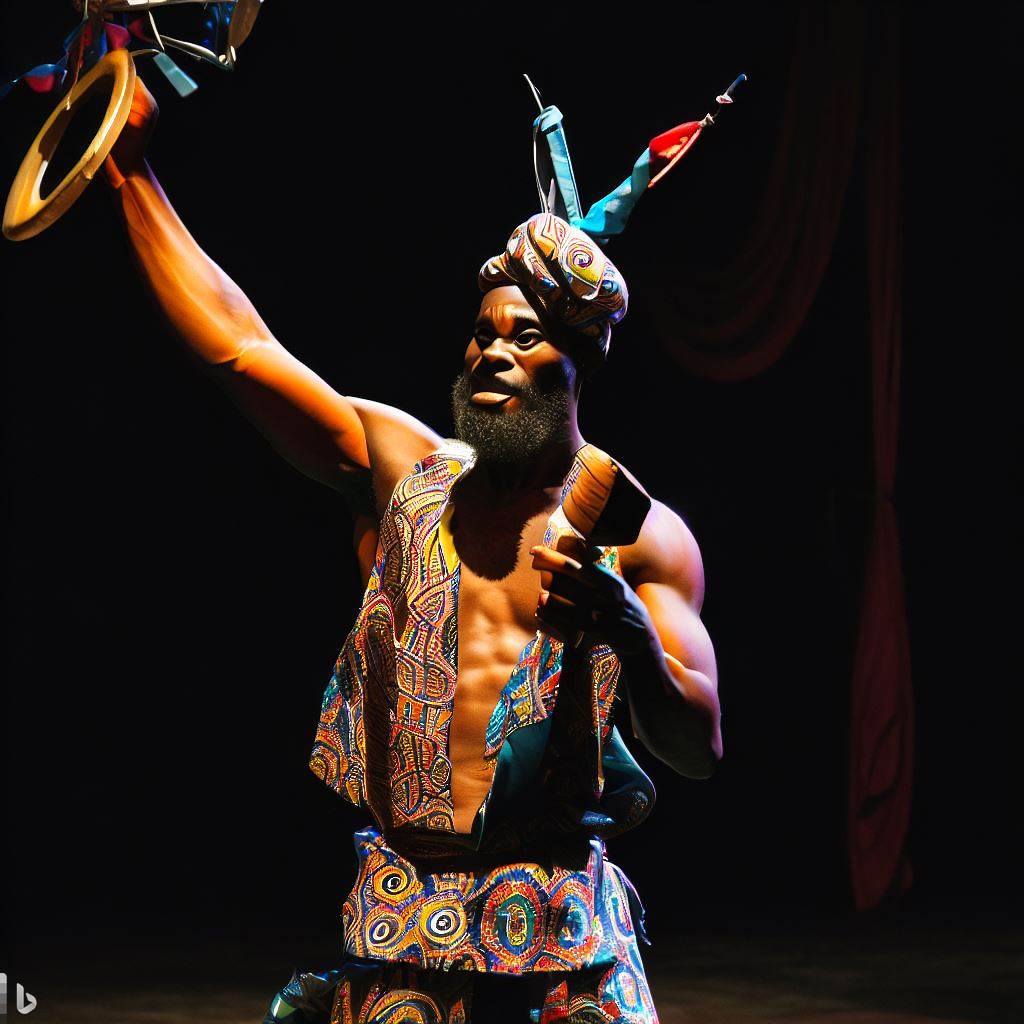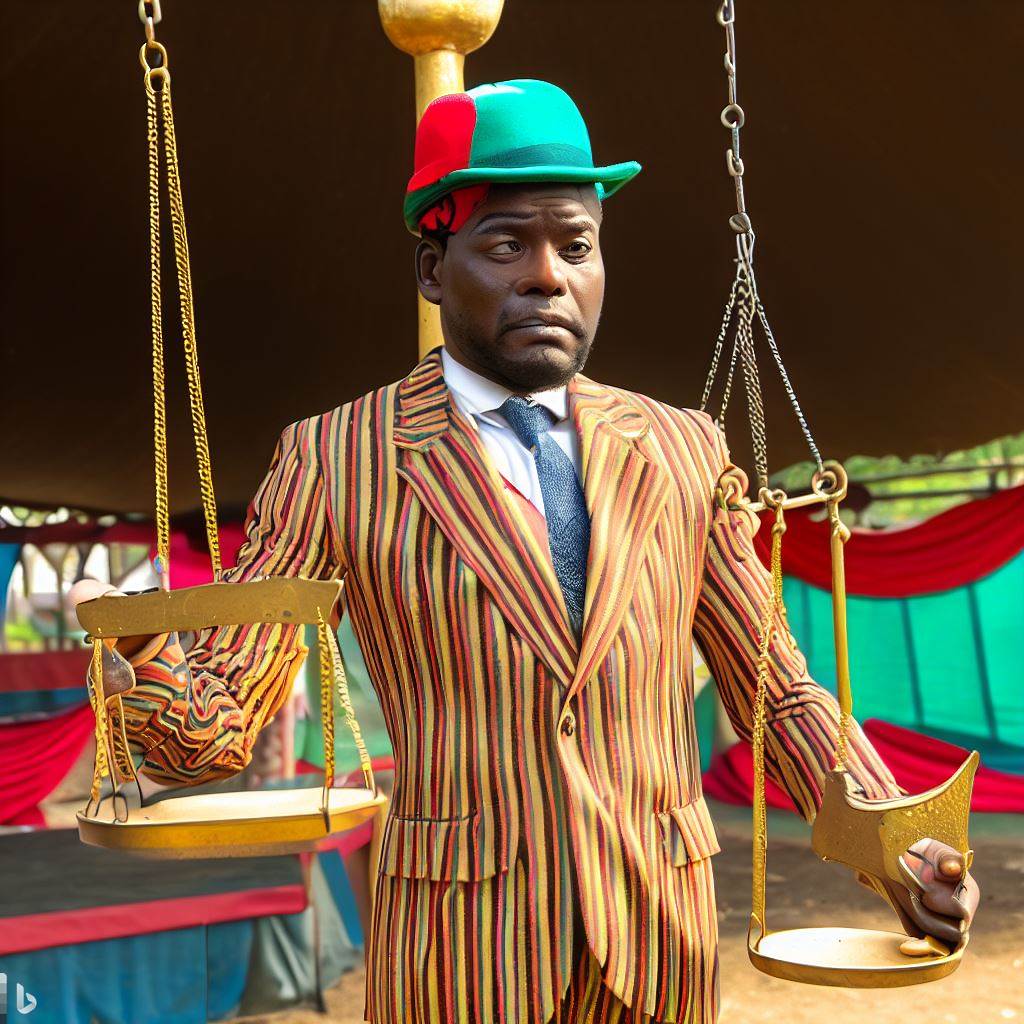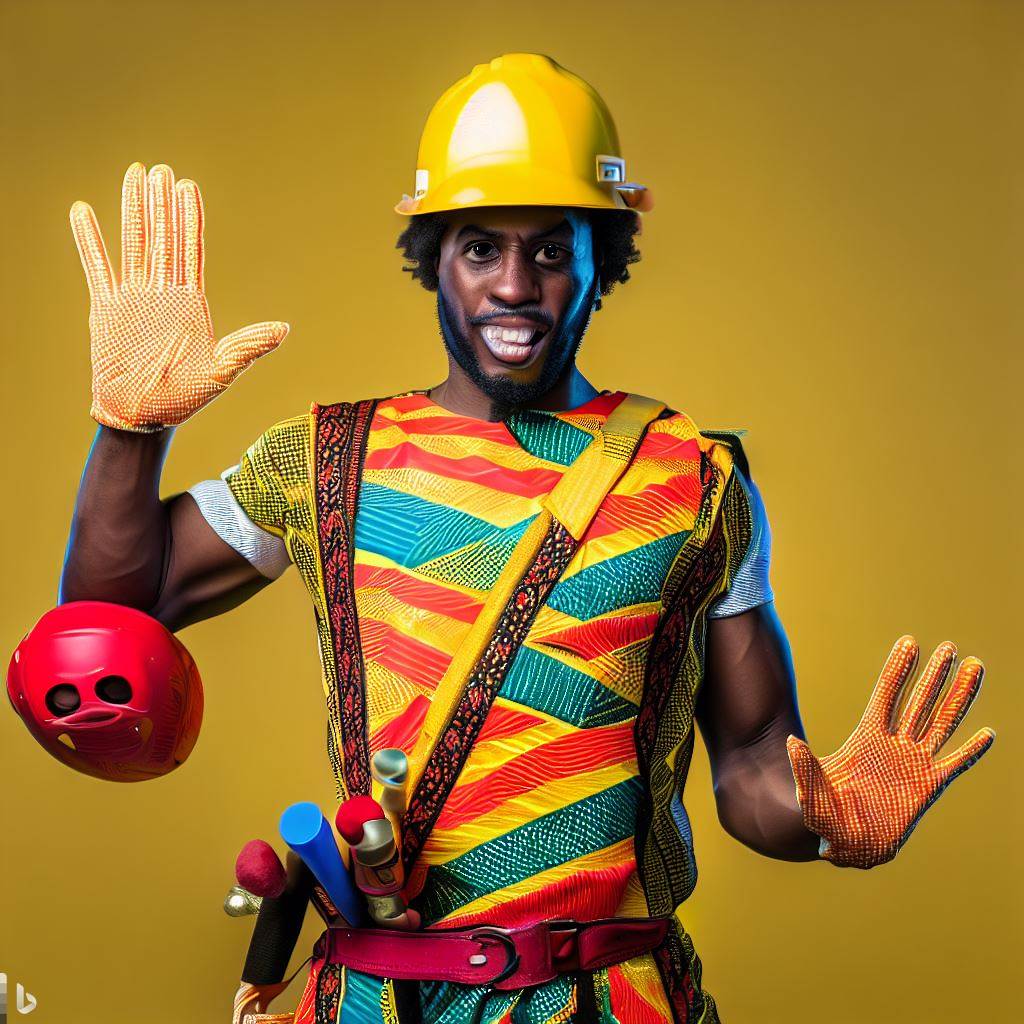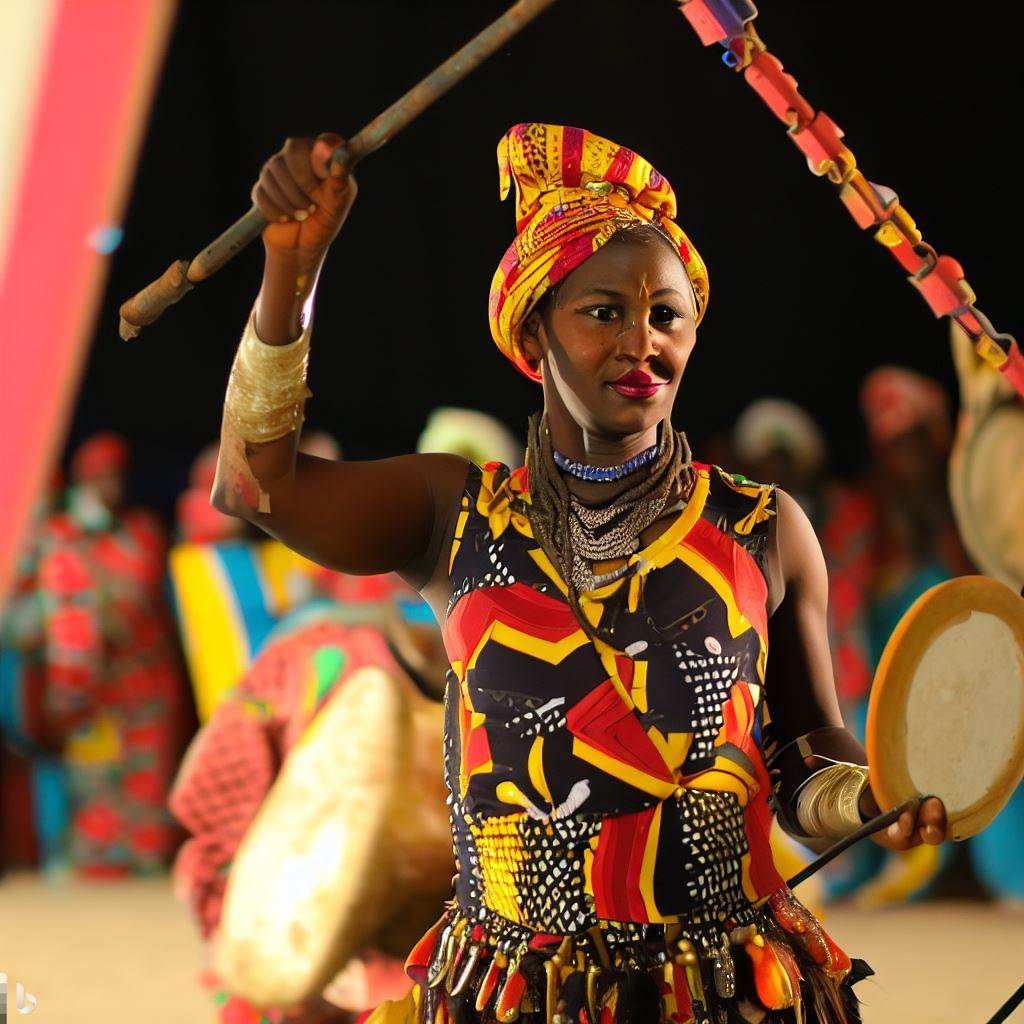Introduction
Nigerian circuses are a vibrant part of the country’s entertainment scene.
In this blog post, we will explore the fascinating art of clowning in Nigerian circuses.
Imagine a young boy, wide-eyed with wonder, as he bursts into laughter at the sight of a clown’s red nose.
Picture this: a colorful sea of spectators, their laughter harmonizing with the vibrant hues of the circus tent. Nigerian circuses are a treasure trove of entertainment, but there’s one aspect that steals the show—
The art of clowning
- A Spectacle to Behold: Nigerian circuses have long been a source of joy and wonder for people of all ages. The magical world under the big top beckons with its promise of whimsical performances.
- The Heart of the Circus: Amidst acrobats, daredevils, and exotic animals, clowns reign supreme. They are the heartbeat of the circus, captivating audiences with their slapstick humor and endearing antics.
- The Clown’s Debut: Imagine a clown’s first step into the spotlight, the room engulfed in hushed anticipation. Then, a clumsy pratfall or an oversized shoe mishap—the crowd erupts in laughter.
- Universally Loved: Clowning transcends language barriers, making it universally loved. In Nigerian circuses, clowns bridge diverse cultures through laughter, fostering unity among spectators.
- The Skill Behind the Silly: Behind the red noses and oversized shoes, clowning is a finely honed craft. These performers dedicate themselves to perfecting physical comedy, timing, and improvisation.
- A Symbol of Resilience: Nigerian circus clowns also symbolize resilience. They bring laughter even in the face of adversity, showcasing the power of humor to overcome challenges.
- The Clown’s Code: Clowns follow an unwritten code—spreading joy, laughter, and positivity. They teach us that even in life’s circus, we can find moments of hilarity.
- Beyond the Circus Tent: The art of clowning extends beyond the circus. Nigerian clowning traditions influence comedy and entertainment, leaving an indelible mark on the nation’s culture.
- Join the Fun: So, step right up, folks! Join us as we embark on a journey through Nigerian circuses, exploring the enchanting world of clowning—a world where laughter knows no bounds.
In this series, we will delve deeper into the history, techniques, and impact of clowning in Nigerian circuses, unlocking the secrets behind the smiles and chuckles that have captivated generations.
Understanding Nigerian Circuses
Brief History of Nigerian Circuses
Nigerian circuses have a rich history, dating back to colonial times in the late 19th century.
These circuses were initially influenced by European circus traditions brought by colonial masters.
The first Nigerian circus, Royal Circus, was established in Lagos in the early 1900s.
During this time, circus performances were mainly imported from Europe and featured foreign performers.
Significance of Nigerian Circuses in Entertainment Culture
Nigerian circuses play a crucial role in shaping the country’s entertainment culture.
They provide a platform for artists to showcase their talents and entertain audiences of all ages.
Nigerian circuses serve as a source of entertainment, escapism, and cultural exchange for both rural and urban communities.
These circuses contribute to the economy by creating job opportunities for artists and support staff.
Different Types of Performances in Nigerian Circuses
- Acrobatics: Acrobatic performances are a staple in Nigerian circuses, showcasing the incredible strength, agility, and flexibility of performers.
Acrobats perform daring acts such as human pyramids, somersaults, contortionism, and balancing acts.
These performances require intense training and physical discipline to execute the stunts flawlessly. - Clowning: Clowns, with their colourful costumes and comedic acts, bring laughter and joy to Nigerian circus audiences.
Clowns use humour, slapstick comedy, and visual gags to entertain and engage with the audience.
Their performances often involve improvisation and interaction with spectators, creating a lively and engaging atmosphere. - Animal Performances: Some Nigerian circuses feature trained animals, such as lions, elephants, horses, and dogs.
These animals showcase their skills through tricks, stunts, and obedience to their trainers’ commands. - Fire and Daredevil Acts: Circus performers in Nigeria also engage in fire and daredevil acts to captivate audiences.
These acts often include fire breathing, fire juggling, sword swallowing, and walking on the edge of sharp objects.
These daring performances showcase the performers’ bravery and skill, leaving the audience in awe.
Nigerian circuses have a fascinating history deeply rooted in colonial influences.
They hold significant importance in Nigeria’s entertainment culture, providing entertainment and employment opportunities.
Nigerian circuses offer diverse performances, including acrobatics, clowning, animal shows, and fire acts.
These performances captivate audiences and contribute to the cultural fabric of the nation’s entertainment scene.
The Role of Clowning in Nigerian Circuses
Clowning and its importance in circus performances
- Clowning is a form of performance art that utilizes physical comedy, satire, and absurdity.
- Clowning is important in circus performances as it brings laughter, entertainment, and acts as a bridge between performers and audiences.
- Clowns often serve as the comic relief, creating a jovial atmosphere and adding an element of surprise and joy to the show.
The traditional and contemporary styles of clowning in Nigerian circuses
- Nigerian circuses showcase both traditional and contemporary styles of clowning.
- Traditional Nigerian clowns draw inspiration from local folklore, using colorful costumes, masks, and exaggerated gestures.
- Contemporary Nigerian clowns often incorporate elements of modern humor and mimicry to resonate with diverse audiences.
The skills and techniques employed by Nigerian clowns
- Nigerian clowns possess a wide range of skills, including physical comedy, improvisation, juggling, and acrobatics.
- They excel at engaging with audiences through interactive performances, breaking the fourth wall.
- Nigerian clowns also use facial expressions, body language, and vocal range to convey emotions and comedic situations.
In Nigerian circuses, clowning plays a vital role in entertaining audiences and enhancing the overall experience of the show.
Clowning, as a form of performance art, relies on physical comedy, satire, and absurdity to generate laughter and delight.
It serves as the backbone of circus performances by creating a light-hearted atmosphere and acting as a bridge between the audience and other performers.
Traditional Nigerian circus clowning draws inspiration from local folklore, showcasing colorful costumes adorned with masks and employing exaggerated gestures.
These clowns evoke a sense of nostalgia and cultural identity, connecting with the audience on a deeper level.
Their performances often feature hilarious skits and narratives that reflect the values and traditions of Nigerian society.
On the other hand, contemporary Nigerian clowns incorporate modern humor and mimicry into their acts, catering to the evolving tastes of diverse audiences.
They skillfully blend traditional clowning techniques with contemporary comedic elements, resulting in performances that resonate with both young and old.
Nigerian clowns possess an array of skills and techniques that contribute to their excellence in the field.
Besides their mastery of physical comedy, which includes slips, falls, and humorous movements, they are adept at improvisation.
This enables them to create on-the-spot comedic situations that engage the audience’s participation and make each performance unique.
Read: The Evolution of Artist Management in Nigerian Music
Cultural Context: Clowning in Nigerian Society
Perception of Clowns in Nigerian Culture
Clowns hold a unique position in Nigerian culture, often seen as entertainers and tricksters.
They are perceived as funny and mischievous individuals, capable of bringing joy and laughter.
Clowns are often portrayed in colorful costumes and exaggerated makeup to emphasize their comedic nature.
Despite their jovial image, clowns are sometimes associated with deception and playing pranks on unsuspecting victims.
Reflection of Societal Values and Beliefs
Clowning in Nigeria reflects the importance of humor and entertainment in society.
By providing laughter and amusement, clowns serve as a means of escape from the challenges of everyday life.
They embody the belief that laughter is a powerful tool to bring people together and promote happiness.
Clowning also serves as a form of social commentary, highlighting the absurdities and contradictions of Nigerian society.
Unique Aspects of Nigerian Clowning
Nigerian clowning incorporates elements of traditional folklore, music, and dance.
Clowns often use traditional Nigerian instruments such as drums and flutes to enhance their performances.
They tell stories and perform skits that reflect Nigerian customs, traditions, and cultural heritage.
Nigerian clowns are known for their improvisational skills, often engaging with the audience and responding to their reactions.
They are adept at adapting their acts to different regions, languages, and cultural contexts across Nigeria.
Read: Understanding Contracts in the Nigerian Art Management
Challenges and Advancements in Nigerian Clowning
Address the difficulties faced by Nigerian clowns in the industry
- Nigerian clowns often struggle with societal perception and lack of recognition.
- Their profession is not taken seriously, leading to limited opportunities and financial struggles.
- There is a lack of proper training programs and resources for aspiring Nigerian clowns.
- Nigerian clowns face the challenge of maintaining relevance in a constantly evolving entertainment industry.
- They struggle with the stereotype that clowning is only for children’s entertainment, limiting their audience.
- Many Nigerian clowns lack access to proper clowning equipment and props, hindering their performances.
The impact of globalization and modernization on Nigerian clowning
- Globalization has led to the introduction of different clowning styles and techniques in Nigeria.
- Nigerian clowns now have access to international platforms and collaborations, expanding their horizons.
- The influence of modernization has sparked creativity and innovation among Nigerian clowns.
- Modern technologies have allowed Nigerian clowns to reach a wider audience through social media and online platforms.
- The exposure to global clowning trends has challenged Nigerian clowns to adapt and enhance their performances.
- Globalization has also brought opportunities for Nigerian clowns to participate in international clowning festivals and workshops.
Recent advancements or innovations in Nigerian clowning techniques
- Nigerian clowns have started incorporating dance and acrobatics into their performances, adding more dynamism.
- Improvised comedy and interactive storytelling have become popular techniques among Nigerian clowns.
- More Nigerian clowns are exploring physical comedy, using exaggerated gestures and facial expressions to entertain.
- Clown therapy is gaining recognition in Nigeria, with clowns using their skills to bring joy to hospitals and communities.
- Nigerian clowns are collaborating with other art forms, such as music and dance, to create multidisciplinary performances.
- Some Nigerian clowns are using their acts to raise social awareness and address relevant societal issues.
In today’s clowning industry collaboration has become a key factor to success.
Read: Key Responsibilities of a Performer’s Manager in Nigeria
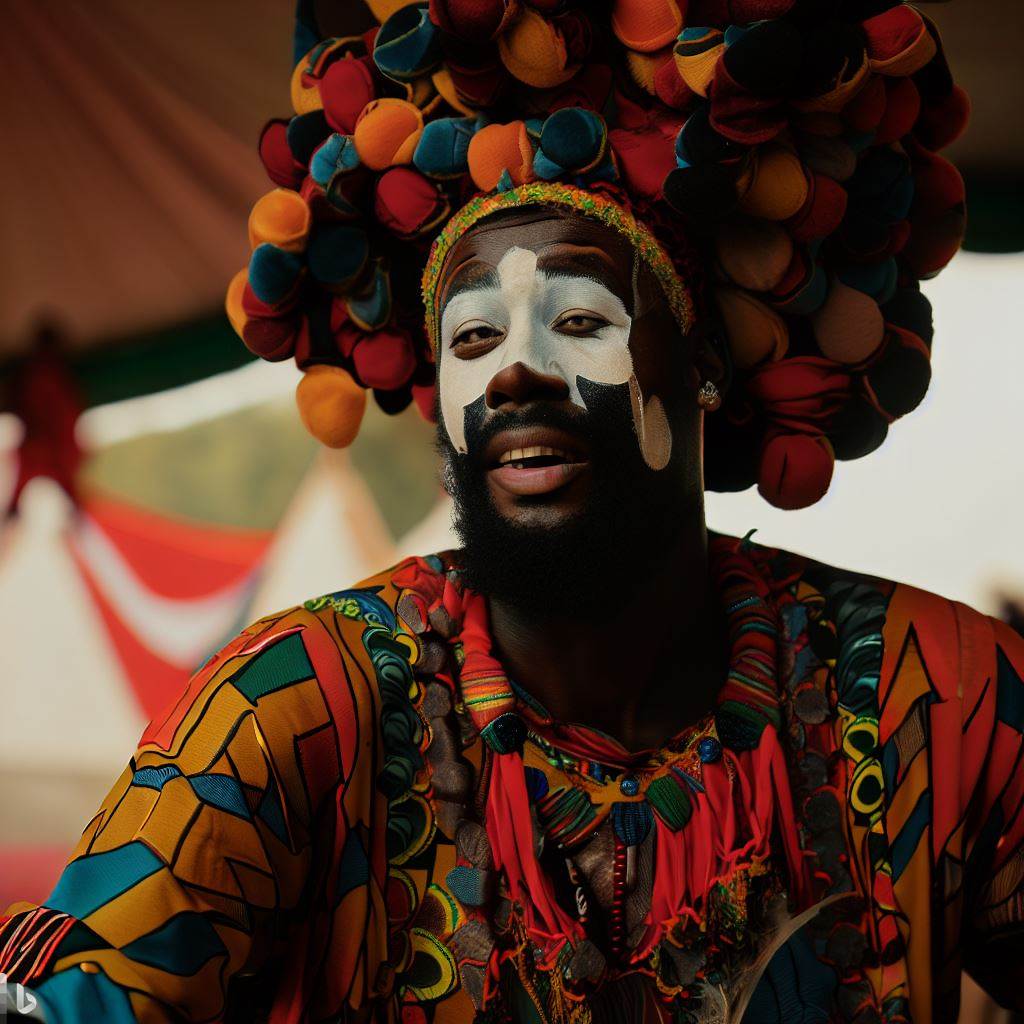
Behind the Scenes: Life of a Nigerian Clown
The lives and training of Nigerian clowns
- Nigerian clowns undergo rigorous and extensive training in various clowning techniques.
- They learn physical comedy, improvisation, mime, and how to create engaging performances.
- Clowning schools and workshops provide a platform for aspiring clowns to develop their skills.
- During their training, Nigerian clowns also learn how to connect with different audiences.
- They study the psychology of laughter and use it to evoke joy and amusement.
- Improving physical coordination and flexibility is a crucial part of their training.
The dedication and commitment required to succeed as a clown
- Being a clown in Nigeria demands immense dedication, perseverance, and passion.
- Performers must constantly push themselves to improve and entertain their audiences.
- Clowns spend years honing their craft and perfecting their skills.
- They must constantly adapt and evolve to stay relevant in the ever-changing entertainment industry.
- Rehearsing and performing for long hours is physically and mentally demanding.
- Clowns must always be ready to think on their feet and handle unexpected situations.
Personal stories and interviews from Nigerian clowns
- Chuka, a popular Nigerian clown, shares his journey from a struggling performer to a successful entertainer.
- He recounts the challenges he faced and how his dedication helped him overcome them.
- Ngozi, another Nigerian clown, talks about the joy she experiences when children laugh at her performances.
- She shares the fulfillment she feels in bringing smiles to their faces.
- Interviews with Nigerian clowns reveal the sense of camaraderie and support within the clowning community.
- They discuss how they inspire and motivate each other to continue pursuing their passion.
- Personal anecdotes highlight the transformative power of laughter in both the performers’ and audience’s lives.
The lives of Nigerian clowns are filled with dedication, training, and a deep passion for bringing laughter to others.
Their commitment to constantly improve their skills and entertain audiences is remarkable.
Through interviews and personal stories, we gain insights into their unique journeys and the joy they derive from their profession.
Nigerian clowns showcase the power of laughter as a universal language that knows no bounds.
Read: How Artist Managers Influence Nigeria’s Music Industry
Impact on Nigerian Society and Beyond
Entertainment value and social impact of Nigerian clowns
Nigerian clowns hold immense entertainment value, captivating audiences with their humorous acts and slapstick comedy.
Their performances serve as a source of joy and laughter for both children and adults alike.
By using physical comedy and exaggerated gestures, Nigerian clowns are skilled at creating a light-hearted atmosphere, allowing people to forget their worries and immerse themselves in the moment.
Moreover, Nigerian clowns have a significant social impact on society. They bring communities together, fostering a sense of unity and shared laughter.
In a country with diverse ethnic groups, clowns transcend cultural barriers and create a common ground for people to connect and interact.
Their performances create a space where individuals from different backgrounds can come together and enjoy themselves without any divisions.
How clowning can bring joy, laughter, and positivity to society
Clowning has the remarkable ability to bring joy, laughter, and positivity to society.
In a world filled with stress and uncertainty, clown performances offer a much-needed escape.
By creating an atmosphere of pure delight and mirth, clowns provide a temporary reprieve from daily challenges, allowing individuals to experience genuine happiness.
The laughter that Nigerian clowns generate has a ripple effect, spreading positivity throughout the community.
Laughter is infectious, and when people witness the comedic brilliance of clowns, it brings a smile to their faces, lightens their hearts, and uplifts their spirits.
This positive energy can create a domino effect, inspiring others to be kinder, more compassionate, and more joyful in their interactions with others.
Contributions of Nigerian clowns to the global circus community
Nigerian clowns have made significant contributions to the global circus community.
Their unique blend of comedy, dance, and acrobatics sets them apart and adds diversity to the world of circus entertainment.
Their performances often incorporate traditional Nigerian cultural elements, such as traditional music, dance, and costumes, which showcase the richness and beauty of Nigerian heritage.
Furthermore, Nigerian clowns have gained recognition and accolades on international stages, showcasing their talent and artistry to the world.
They have participated in various circus festivals and competitions, where they have impressed audiences and judges with their creativity and skill.
Through their performances, Nigerian clowns have not only gained a global following but have also inspired other aspiring clowns from different parts of the world.
Nigerian clowns hold immense entertainment value and have a significant social impact on society.
Through their performances, they bring joy, laughter, and positivity, serving as a catalyst for unity and happiness.
Moreover, Nigerian clowns have made notable contributions to the global circus community, adding diversity and showcasing the cultural richness of Nigeria.
Their art form transcends boundaries, creating an atmosphere of inclusivity and shared laughter.
Find Out More: Cruise Ship Entertainment in Nigeria: Future Prospects
Gain More Insights: An Insider’s Look at the Copywriter Profession in Nigeria
Conclusion
Throughout this blog post, we have delved into the fascinating world of Nigerian circuses and the art of clowning. Here is a recap of the main points discussed:
Main points discussed in the blog post
- Nigerian circuses have a rich history and play a significant role in entertainment culture.
- Clowning is an integral part of Nigerian circuses, providing humor, satire, and social commentary.
- Nigerian clowns are talented performers who use their skills to engage and entertain audiences.
- The colorful costumes and makeup of Nigerian clowns add to the visual spectacle of the circus.
- Clowning in Nigerian circuses serves as a form of escapism for both performers and spectators.
The significance of clowning in Nigerian circuses
Clowning in Nigerian circuses goes beyond mere entertainment; it serves as a reflection of societal issues, a source of laughter and joy, and a means of cultural expression.
These clowns play a crucial role in preserving Nigerian traditions and bringing communities together through laughter.
Closing statement
As we conclude this exploration into the art of clowning in Nigerian circuses, let us remember the transformative power of laughter and the ability of clowns to connect us, regardless of our differences.
In a world often filled with chaos and tension, the clowns of Nigeria remind us of the universal language of joy and the importance of finding lightness in the darkest of times.
Join us in celebrating the vibrant and captivating world of Nigerian circuses and the wonderful art of clowning!

